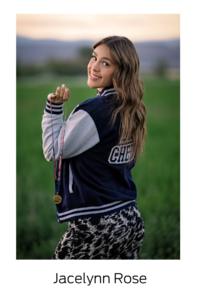Meet Jacelynn and Allie: Navigating Life with Autoimmune Diseases as a Young Adult
Earlier this year, we launched the Young Adult Advisory Council (YAAC) as part of our commitment to actively engage with young people living with autoimmune diseases and addressing their unique needs. This council currently has 16 members ranging from 15-25 years old, living with and advocating for autoimmune diseases.
We recently caught up Allie Place and Jacelynn Rose, two of the group’s members, who shared with us their unique journeys to and through diagnosis, and how they’ve adjusted their lives to live fully while being invested in and connected with patient advocacy.
Q: Walk us through your autoimmune journey.
Jacelynn: By age 8, I was already familiar with life as a “sick kid.” I was diagnosed with cicatricial alopecia and Raynaud’s disease. Even on treatment, I kept getting sicker—rashes, joint pain, and extreme fatigue. My doctors often dismissed my symptoms as growing pains, but my family and I knew something more was going on. At 13, I was diagnosed with lupus, which helped explain my symptoms, but it was still overwhelming. I was told to avoid sugar, gluten, red meat, and other foods, which led to an eating disorder during high school. Feeling isolated was tough, but it also inspired me to advocate for others so no one else would feel as alone as I did.
Allie: Like Jacelynn, I was always active—playing sports, horseback riding, and doing gymnastics. At 13, I had back-to-back injuries that took almost a year to heal, and my family believes this triggered my autoimmune disease, Hashimoto’s thyroiditis, along with other factors. I started experiencing fatigue that would hit out of nowhere. After several tests, doctors finally discovered my high thyroid antibodies, and I was diagnosed at 13. I was lucky to get diagnosed quickly compared to others in this community who often wait years.
 Q: What has been instrumental in helping you navigate and adapt to living with autoimmune disease(s)?
Q: What has been instrumental in helping you navigate and adapt to living with autoimmune disease(s)?
Jacelynn: Learning about proper nutrition and exercise has been key to my remission. It took time to realize that food wasn’t my enemy, which isn’t often discussed in the autoimmune community. I also found that stress was a major trigger for flares. One of the most helpful resources was a book called Goodbye Lupus, which helped my family and me learn how to manage my disease through diet and advocate for my health.
 Q: How does your autoimmune disease affect your social life, school, sports, or other activities?
Q: How does your autoimmune disease affect your social life, school, sports, or other activities?
Allie: Transitioning to a large public high school while being diagnosed was overwhelming. I struggled to manage my disease and felt isolated. Returning to gymnastics was a big goal, but my disease often affected my abilities, especially during flare-ups, which was frustrating during my senior year when I wanted to do my best.
Q: How do you connect and communicate with your doctors as a younger person?
Both Jacelynn and Allie shared that they mostly communicate with their doctors via portal/electronic messaging. It’s the fastest and most efficient way to share information and get questions answered without having to take hours out of the day to go to an in-person appointment, or to travel out of state while away at college.
Q: What advice would you give to other young people recently diagnosed with autoimmune diseases?
Jacelynn: During high school, I had close friends who understood my limitations, which helped. Sometimes I hid away when things got tough, but I found ways to stay busy and positive, like knitting hats for charity or starting awareness projects like “Raising Hope.”
Allie: Learn to advocate for yourself from day one, and don’t be afraid to talk about your symptoms, even when it’s awkward. Communication is key, especially during puberty when everything feels even more challenging.
Q: What does your involvement in the Autoimmune Association and Young Adult Advisory Council (YAAC) mean to you?
Jacelynn: I joined the Autoimmune Association to connect with other patients and researchers, learning more about autoimmune diseases and how we can fight for better research, advocacy, and one day, hopefully, cures. The YAAC has been a great place for empowerment and community.
Allie: I joined the YAAC to help educate and de-stigmatize autoimmune diseases, promote self-advocacy, and make meaningful change. Being part of a group that shares my passion has shown me that I’m never alone, and I want to create that environment for others.
Building Community and Advocacy for Young Adults
Living with autoimmune and other chronic illnesses presents unique challenges for youth and young adults. Navigating school, social activities, sports, and everyday life can feel overwhelming when battling symptoms that others often can’t see or understand. That’s why it’s so important for younger people to share their stories and experiences, helping to build a community where they can support one another. By openly discussing the realities of managing these conditions, young people can offer tips, encouragement, and understanding that only someone who’s been through it can provide. Creating these connections helps reduce the sense of isolation and empowers young adults to advocate for themselves while managing the unique demands of their lives. Through groups like the Young Adult Advisory Council and the advocacy work of people like Jacelynn and Allie, we are helping to create a supportive community and resources that empower young adults with autoimmune diseases.
Follow the Young Adult Advisory Council on Instagram!
Join our email list
Receive the latest blog articles, news, and more right to your inbox!
Related articles you might be interested in

Meet Erika: Battling 6 Autoimmune Diseases—and Advocating for Millions

Autoimmune Association Announces Inaugural Hope Journey Walk Inviting Communities to “Lace Up for Hope”

Art with a Mission: John von Bergen Gives Back to Autoimmune Community Through Sales

Study Reveals Top Environmental Concerns Impacting Autoimmune Patients
Find more resources on autoimmunity
Learn more about autoimmunity, diagnosis tips, how to find a physician, and more.